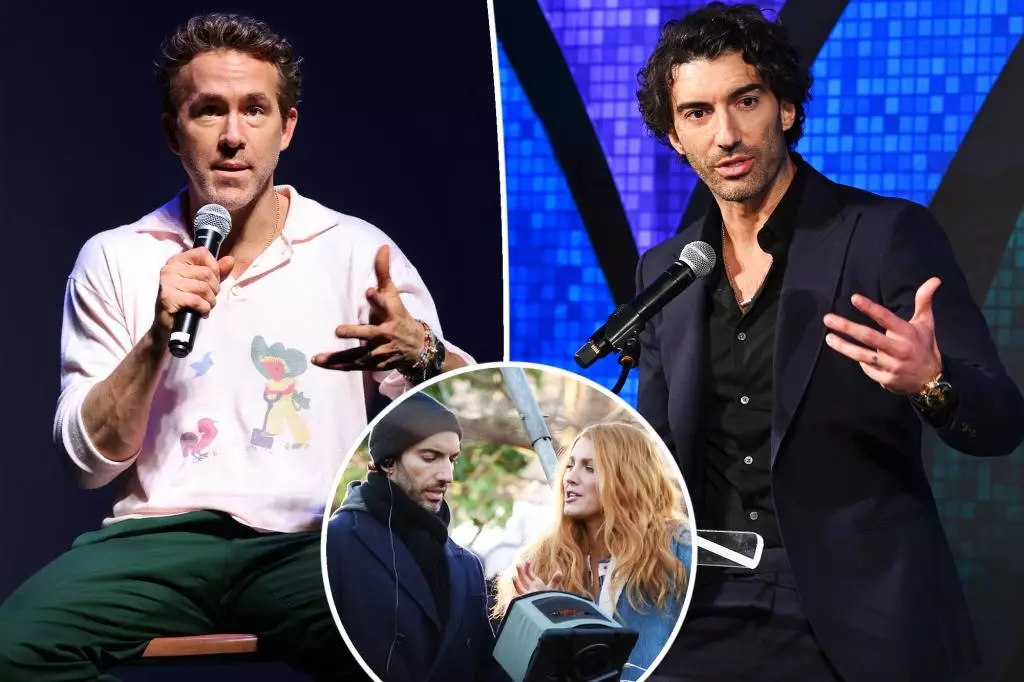The entertainment world is often riddled with drama, and the recent allegations against Justin Baldoni have added significant fuel to the fire, particularly concerning his relationship with Blake Lively and Ryan Reynolds. This complicated web of social media interactions, alleged harassment, and legal confrontations paints a tumultuous picture that deserves exploration. The situation escalated when Baldwin reportedly blocked Reynolds on social media months prior to Lively’s filing of a sexual harassment complaint against him. Such actions raise questions about the dynamics between these high-profile figures in the industry, hinting at deeper issues that may extend beyond the surface narrative.
In May, it became apparent that Baldoni, upon realizing he had been blocked by Reynolds, was concerned that Lively might do the same. This seemingly innocuous act of unfollowing could suggest significant personal and professional rifts arising in their relationships. Baldoni’s text to his publicist—expressing the need for a contingency plan—reveals his anxiety about the potential fallout from these evolving social media dynamics. One must ponder the implications of their digital interactions and how they may reflect deeper conflicts or professional disagreements. Interestingly, while Reynolds chose to sever ties with Baldoni digitally, Lively remained in the ambiguous space of not following Baldoni back while still maintaining connections elsewhere.
The core of the controversy erupted into public view when Blake Lively accused Justin Baldoni of sexual harassment. Her complaints are alarming, particularly considering the nature of the alleged behaviors. They range from showing inappropriate videos and sharing personal stories about past addictions to making uncomfortable comments regarding her body and familial matters. Such allegations not only tarnish Baldoni’s reputation but also shed light on potentially toxic work environments in the film industry. This unearthing of workplace misconduct calls for attention, especially as Lively seeks to advocate for victims of similar harassment—asserting that her legal actions aim to expose harmful narratives and empower those who might feel silenced.
Baldoni’s response to these allegations through his legal team cannot be overlooked. His attorney, Bryan Freedman, has categorically refuted the claims, labeling them as “outrageous” and deliberately damaging. This defensive posture suggests a belief that the allegations are as much about personal vendetta as they are about genuine grievances. Moreover, Freedman’s comments about Lively’s alleged demands during filming further complicate the narrative. They signal a potential power struggle on set that raises questions about professional conduct and the creation of a supportive working environment.
The discourse surrounding this clash not only affects the individuals involved but also invites broader contemplation of the culture within Hollywood. The revelations about Baldoni’s behavior echo a larger movement towards accountability within the entertainment industry. With numerous allegations surfacing against prominent figures, there’s a pressing need for more robust policies that protect individuals from misconduct and provide clear pathways for reporting grievances. Lively’s hopes of shedding light on retaliatory practices against those who speak out against harassment represent a crucial step towards fostering a safer environment.
As this intricate drama continues to unfold, it serves as a stark reminder of the complex interplay between personal relationships and professional collaborations in the often-high-pressure environment of film production. It’s important for both fans and industry insiders to reflect on these dynamics without jumping to conclusions based solely on social media narratives. Navigating the world of celebrity interaction, while ensuring a culture of respect and accountability, is an ongoing challenge that extends far beyond one incident or perception. As this story develops, it is vital that we listen, learn, and advocate for change in a manner that prioritizes the dignity and safety of all individuals involved.

